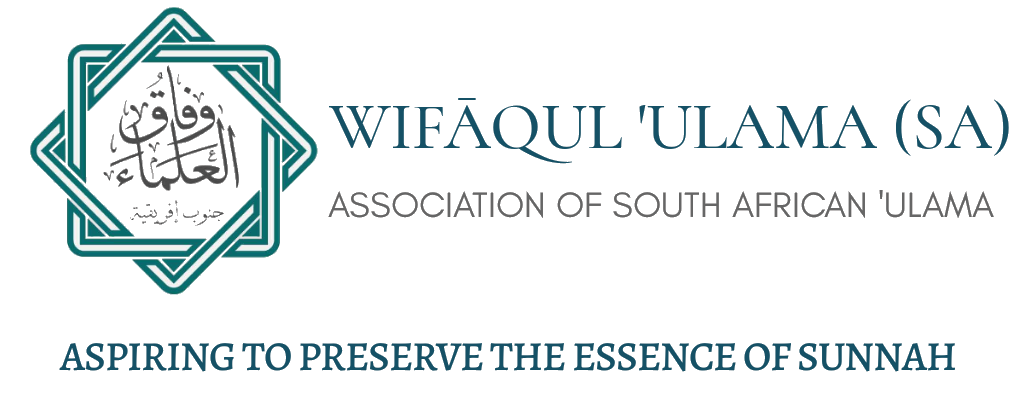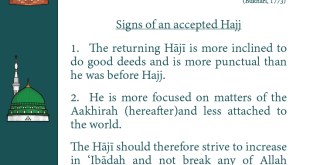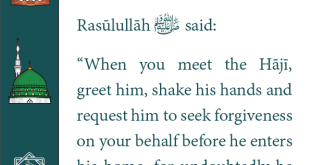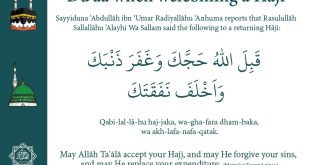The Farewell Hajj – Part 6
The Plain of ‘Arafat
During the ninth day of Zhul Hijjah, as the sun rose, Rasulullah Sallallahu ‘Alayhi Wa Sallam departed from Mina towards ‘Arafat.
This is the meaning of the verse:
ثُمَّ أَفِيضُوا مِنْ حَيْثُ أَفَاضَ النَّاسُ [البقرة: 199]
“And proceed from the place where the people proceed from (from Arafaat, then on to Muzdalifa and back to Mina previously the people used to go the Muzdalifa-Arafaat border, while only the Quraysh used to go to Arafaat).”
Hence, Rasulullah Sallallahu ‘Alayhi Wa Sallam journeyed through Muzdalifah to ‘Arafat; all along, Rasulullah Sallallahu ‘Alayhi Wa Sallam and the Sahaabah Radiyallahu ‘Anhum continued to recite the Talbiyah and Takbeer. Arriving at ‘Arafat, Rasulullah Sallallahu ‘Alayhi Wa Sallam pitched his tent and remained at Namirah. At Zawaal, he prepared his camel Qaswa and proceeded to Batn Wadi, where he delivered a remarkable sermon.
In this sermon, Rasulullah Sallallahu ‘Alayhi Wa Sallam announced the abolishment of the blood money of Ibn Rabi’ah and also announced the abolition of usury and declared that the usury of Abbas bin Abdul Muttalib Radiyallahu ‘Anhu was the first to be abolished. In his sermon, he emphasized the abolishment of the practices stemming from the pre-Islamic era, proclaiming, “Every practice of ignorance is now beneath my feet.”
After concluding his sermon, Rasulullah Sallallahu ‘Alayhi Wa Sallam instructed Bilal Radiyallahu ‘Anhu to call the Adhan and Iqamah for Salaah. He then performed two Rak’aat of Zuhr, followed immediately by two Rak’aat of ‘Asr. Subsequently, he rode his camel Qaswa to the Mawqaf, near the rocks beneath Jabalul Rahmah, where he fervently made Du’aa and supplicated, shedding tears in humility before Allah Ta’alaa. Rasulullah Sallallahu ‘Alayhi Wa Sallam supplicated in a manner similar to a hungry person asking for assistance from a benevolent and generous patron. His hands were raised, and he cried profusely while engaging in Du’aa until sunset.
While standing in ‘Arafat, Rasulullah Sallallahu ‘Alayhi Wa Sallam prayed for the forgiveness of his ummah. According to the Sunan of Ibn e Majah, his supplication was answered, except for those who oppress others, for whom he sought justice. Rasulullah Sallallahu ‘Alayhi Wa Sallam Du’aas were accepted, signifying a moment of divine mercy and forgiveness for his followers.
It was on the plains of ‘Arafat that the following blessed verse of the Qur’an Karim was revealed:
الْيَوْمَ أَكْمَلْتُ لَكُمْ دِينَكُمْ وَأَتْمَمْتُ عَلَيْكُمْ نِعْمَتِي وَرَضِيتُ لَكُمُ الْإِسْلَامَ دِينًا [المائدة: 3]
“Today, I have perfected your Deen for you (leaving no room for additions or omissions), completed My bounty upon you (because Islaam is a complete and everlasting code of life) and chosen Islaam as your Deen.”
This verse, considered of profound significance, was revealed to Rasulullah Sallallahu ‘Alayhi Wa Sallam after the ‘Asr Salaah on a Friday. Rasulullah Sallallahu ‘Alayhi Wa Sallam was on his camel, Adhbah, and it seemed that due to the weight of the revelation, the camel’s knees had started to buckle.
Departing from ‘Arafat
As the sun dipped below the horizon of ‘Arafat, Rasulullah Sallallahu ‘Alayhi Wa Sallam bid farewell to the sacred plain, accompanied by Sayyiduna Osama bin Zayd Radiyallahu ‘Anhu riding behind him. Their departure was at a serene pace. Rasulullah Sallallahu ‘Alayhi Wa Sallam maneuvered his horse with practised ease. Whether traversing wide expanses or navigating hills, he adjusted his speed accordingly, ensuring a smooth journey back from ‘Arafat.
Leading the caravan towards Muzdalifah, Rasulullah Sallallahu ‘Alayhi Wa Sallam was surrounded by his devoted companions and followers, and their every step was watched over by the angels and acclaimed by the creator of the Universe. With his left hand guiding the camel and his right hand urging the faithful to maintain peace.
Throughout the journey, Rasulullah Sallallahu ‘Alayhi Wa Sallam continued reciting the Talbiyah, pausing only momentarily to dismount, relieve himself and perform ablution. Rasulullah Sallallahu ‘Alayhi Wa Sallam rode till he reached Muzdalifah. He dismounted and performed a perfect ablution (Wudhu); the Iqaamah was given, and he led the Maghrib Salaah. In the meanwhile. Then, the Iqama was given for the ‘Isha Salaah, which Rasulullah Sallallahu ‘Alayhi Wa Sallam led, and no Salaah was offered between the two Salaah (‘Isha and Maghrib).
Muzdalifah is a place located between ‘Arafat and Mina that is included within the borders of the Haram; its other name is Jam’. Notably, Rasulullah Sallallahu ‘Alayhi Wa Sallam granted permission to the womenfolk, children, and elderly among the Ahl e Bayt (his family) to depart for Mina at night, cautioning them not to perform Rami before sunrise. This compassionate gesture highlights Rasulullah Sallallahu ‘Alayhi Wa Sallam’s consideration for the vulnerable members of his community. (Sunan Al Tirmizi, Hadith 893, Pg 164)
In the tranquillity of Muzdalifah, Rasulullah Sallallahu ‘Alayhi Wa Sallam rested and did not perform Tahajjud Salaah that night. As soon as it was early dawn, Rasulullah Sallallahu ‘Alayhi Wa Sallam performed the Fajr Salaah at its earliest time. Thereafter, he travelled to Mash’arul Haraam where he engaged in fervent supplication, remembering and praising Allah Ta’alaa. Here, his Du’aa for the ummah, previously unfulfilled in ‘Arafat, found acceptance.
 Wifāq ul Ulāma (SA) ASSOCIATION OF SOUTH AFRICAN 'ULAMA
Wifāq ul Ulāma (SA) ASSOCIATION OF SOUTH AFRICAN 'ULAMA


